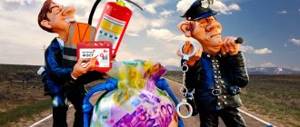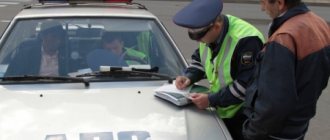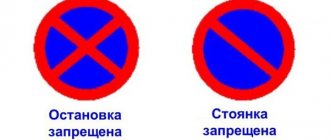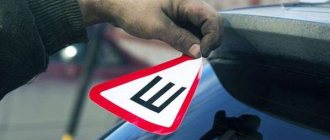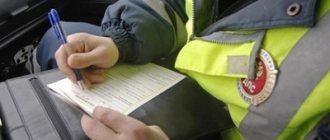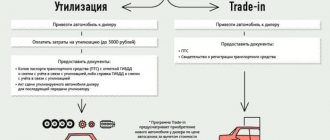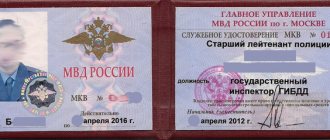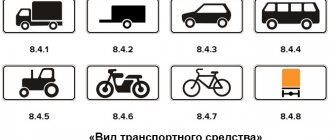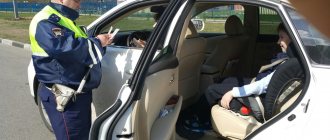What is stopping a vehicle according to the law?
This opinion is erroneous when drivers believe that when stopping a driver and checking documents, the inspector is essentially detaining the motorist. No, in fact, from a superficial linguistic analysis it “delays”. However, this is not formally a detention.
For this term, the legislation of 2021 provides for a separate administrative procedure - the Federal Law on Police implies by this a short-term restriction of a citizen’s freedom, and paragraph 180 of the Administrative Regulations introduced by Order No. 664 of the Ministry of Internal Affairs indicates that in order to be detained, delivery to a certain department of the Ministry of Internal Affairs or the State Traffic Safety Inspectorate is mandatory. In addition, detention is always preceded by a mandatory protocol.
Thus, all actions of a traffic police officer after stopping a car cannot be called a detention until the appropriate protocol is drawn up and the driver is sent to the department. And this is good news, because otherwise the driver could be detained for up to 48 hours.
And correctly, this procedure is generally called the execution of the state function of the traffic police - specifically stopping a vehicle.
You will also be interested in:
- Is it possible to post videos of traffic police officers on the Internet?
- Does a traffic police officer have the right to stop and check the documents of pedestrians and passengers?
- Is it legal for a traffic police inspector to demand that he get out of the car?
What vehicles can traffic police officers use?
In accordance with clause 6.11 of the Traffic Rules of the Russian Federation, a requirement to stop a vehicle is given using a loud-speaking device or a hand gesture directed at the vehicle. The driver must stop at the place indicated to him.
Methods for stopping a car by an inspector.
- orientations, other information about their use for illegal purposes;
- the need to check the markings of the vehicle and compare them with the entries in the registration documents;
- presence of signs of non-compliance of the transported cargo with the data specified in the accompanying documents for the transported cargo.
For this you need to have a reason. During the inspection, the employee should not touch the car; he can touch things, but not open the bags. During the inspection, the driver and passengers must leave the cabin. In this case, there must be grounds for the presence of prohibited items in the car that caused the violation. Two witnesses must be involved. Conducting a personal search of people and personal belongings also requires grounds and drawing up a protocol.
- The inspector stops the car if he suspects a drunk driver.
- If there are grounds, a protocol of removal from driving a car, an inspection report is drawn up, and witnesses are invited. The driver has the right to refuse.
- If the device does not detect intoxication, or you refuse, but the inspector has doubts, or the driver himself has doubts, then a referral for a medical examination is issued.
- Based on its results, a decision is made: deprivation of rights through the court, evacuation of the car to a impound lot, or the driver is released.
Intoxication check
This right is provided in Article 13 of the Police Law. But the conversation is only about public buildings and premises. The inspector does not have the right to enter the house or apartment. This is possible only for special employees of the Ministry of Internal Affairs on certain grounds relating to criminal cases.
You might be interested ==> What about vouchers for Moscow disabled people in 2021
When using a hand signal, the driver must carry a baton or disk with a red reflector. In this case, the inspector must first point the rod towards the car, and then to the place where the driver should stop the vehicle. In any case, all signs must be clear and not contradictory.
How long can an employee retain a driver?
So, the answer to our question is contained in the Administrative Regulations, but in different paragraphs. However, unfortunately, there is no indication of a specific period here - it all comes down to the fact that such a period should be minimal.
Immediately after stopping
Clause 89 of the regulations prescribes that the traffic police officer is obliged to immediately approach the car that he stopped - without delay.
Does this mean that delay is allowed if he stopped several cars at once and approaches them in turn? No, the administrative regulations do not allow any conventions - it says “without delay”, which means immediately.
Having approached the driver, the inspector has other relevant responsibilities:
- immediately after stopping, the traffic police inspector must introduce himself, stating his last name, rank or position,
- present an official identification card upon request of the driver,
- talk about the reason for the stop,
- request documents for verification.
We have provided a complete list of rules for stopping cars in the corresponding article.
How many can check documents?
Let's move on. The period for document verification is not directly regulated by the laws of 2021. However, paragraph 91 of the Administrative Regulations indicates that further actions of the police officer must be in full compliance with the legislation of the Russian Federation.
In pursuance of the activities of the police, the Federal Law of the same name was issued, Article 5 of which directly prescribes that activities that are related to the restriction of human freedoms must immediately stop if the goal is achieved (in our case in the supervision of road safety in a general sense) or if it cannot be achieved by such a limitation.
Thus, in theory, the traffic police inspector is obliged to check and immediately give you the documents if you have not committed an offense, and wish you a good trip. In practice, since the specific time of the inspection is not regulated at all, the inspector can, for example, punch a driver’s license into the database, but how much time this will take, given the possible poor connection on the highway, is a second question, alas.
Paragraph 100 of the regulations also directs the inspector to release the driver immediately after completing the purpose of checking the documents. And paragraph 105 prescribes the same actions in the event of a pedestrian stopping.
Time to draw up a protocol and/or resolution
We move in order and get to the preparation of administrative material. Here this issue is regulated by paragraphs 35-37 of the regulations, which indicate that:
- the time frame for completing administrative procedures, which includes drawing up papers regarding a driver’s violation, should be the minimum necessary for this - that is, there is a prohibition on intentionally stalling for time by a traffic police officer,
- filling out the protocol or resolution must begin immediately after the occurrence of the violation (but, of course, after contacting the driver as soon as possible and checking his documents),
- if the inspector deliberately stalls for time by detaining the driver after stopping the car, then such actions can be appealed.
Something else useful for you:
- How long do you need to wait for the traffic police at the scene of an accident according to the regulations?
- Is it possible to film a traffic police officer under the new law?
- Suspension from driving a vehicle in questions and answers
How long can a traffic police inspector detain a car?
This applies to an ordinary stop and document check (when you are simply stopped on the road).
- “The procedure for detaining vehicles is defined in Article 27.13 of the Code of the Russian Federation on Administrative Offenses. In addition, the detention of vehicles can be carried out in the manner prescribed by Article 11 of the Law of the Russian Federation “On the Police”. In accordance with the Administrative Regulations (approved by Order of the Ministry of Internal Affairs of Russia dated March 2, 2009 No. 185), the timing for the execution of administrative procedures (actions) by traffic police officers, including the detention of vehicles, should be the minimum necessary for their implementation based on the specific situation. Actions of employees that entail an unreasonable increase in the time of execution of administrative procedures (actions) in relation to road users are appealed pre-trial (to the heads of the relevant combat units of the State Traffic Inspectorate, to the higher management bodies of the State Traffic Inspectorate) and in court.”
What to do if the inspector takes a long time?
- First of all, you need to call the duty department and complain. Clause 52 of the Administrative Regulations obliges a traffic police officer, at the request of a citizen, to tell him the telephone number of the duty station. By calling you can also call the responsible persons for investigation, but in this case you may be refused.
- Secondly, you need to confirm in any case the illegal actions of the police officer. Therefore, it is necessary to videotape communications with the traffic police - from the very stop to the farewell. When appealing his actions, no one may believe you or send you a formal reply stating that no signs of violation were found by the latter.
- You can then file a complaint. The appeal is carried out in accordance with Section V of the regulations.
In this case, you can file a complaint with 2 authorities:
- to the superior officer of the traffic police officer who committed the violation,
- to the prosecutor's office at the place where the offense was committed.
The complaint is submitted in free form - you simply indicate all the violations of the inspector, what they were, the circumstances of stopping your car and demand that he be brought to disciplinary liability.
But the result, alas, in most cases may not be entirely comforting for you - almost always the response comes with a formal notice of disciplinary action. You cannot check whether they were actually accepted. And in practice in 2021, they will also not initiate a criminal case for illegal restriction of a citizen’s freedoms because of this.
Let us examine in detail in what cases traffic police officers can stop you.
So, the reasons for stopping by traffic police officers include:
1. Signs of violations of road safety requirements identified visually or recorded using technical means. If you have violated traffic rules, you have often created a dangerous situation; seeing this, the traffic police officer MUST stop you. This is his direct job responsibility. If an employee recorded a violation, but did not stop the violator, then this will be a violation on his part.
I am categorically against those situations where a person knows that he has violated, but does his best to prove the opposite. Traffic rules are written to be followed.
Useful material: what to do if you violated the requirements of a traffic sign that is not visible
2. Availability of data (orientations, information from the duty officer, other squads, road users, visually recorded circumstances) indicating the involvement of the driver and passengers in the commission of a traffic accident, crime or administrative offense. Everything is clear with the directions. All such information is recorded. And about each call to the traffic police duty department of persons who report such information, a note is made and the data is transferred to the post or the appropriate crew. For example, if a driver behaves inappropriately on the highway, you can call the traffic police and report it. Employees (crew or at the post) of the traffic police are obliged to stop the driver and check the information.
3. Availability of data (orientations, information from operational reference and search records, information from the duty officer, other squads, road users) about the use of the vehicle for illegal purposes or grounds to believe that it is wanted. As a rule, if information of this nature is received, then all cars that fit the description are stopped. And I would not recommend contradicting common sense in such a situation and trying to find grounds for complaints. Just put yourself in the shoes of the person whose car was stolen. And the traffic police officers (no matter how they want it) are taking measures to search for the car.
4. The need to interview the driver or passengers about the circumstances of the commission of a traffic accident, administrative offense, crime of which they were or are eyewitnesses. Everything is clear here too. You provide the necessary information, it is recorded, and you are free.
5. The need to involve a road user as a witness. The situation is similar to that in the previous paragraph, with the only difference being that all data will be entered into the protocol. From a civic standpoint, I would recommend at least a superficial familiarization with the situation. For example, if the driver is drunk, and you are asked to sign the relevant documents as a witness in order to confirm the information, then it is advisable to still see if the situation really turns out that way. You never know...
6. Carrying out administrative and regulatory actions. Everything is clear here. For example, a traffic light does not work or your car, after a not entirely successful maneuver, makes it difficult for other cars to move with its position. In this case, the traffic police officer has the right to stop you or give instructions to perform certain maneuvers.
Useful material: driving into the oncoming lane without markings - how to challenge
7. The need to use a vehicle (paragraph 5 of paragraph 4 of this order in question). It is used very rarely; everything is written in detail in the relevant part of the order.
8. The need to involve the driver to assist other road users or police officers. This reason can occur in the event of serious accidents, terrorist attacks and other emergencies. Mutual assistance on the road has not been canceled...
9. Carrying out, on the basis of administrative acts of the heads of internal affairs bodies, management bodies of the State Traffic Inspectorate, special events related to the inspection in accordance with the goals of the relevant special events of vehicles, persons traveling in them and transported goods. But here it gets more interesting. These are the same events popularly called “raids”. You've probably encountered the fact that on weekend evenings, traffic police officers stand on the city streets and stop almost all the cars that pass by them in order to catch drunk drivers. Similar events are regularly carried out on tinting or “xenon”. In this case, it is useless to demand any supporting documents from the traffic police officer; he is not obliged to show them to you. Your duty in this case is to comply with his legal requirements.
10. Checking documents for the right to use and drive a vehicle, documents for the vehicle and the cargo being transported, as well as documents identifying the driver and passengers (only at stationary traffic police posts).
This item is specially highlighted in bold because... News began to appear on the Internet that this item no longer works and you can check it everywhere. It's still working. As soon as it stops working, I will let you know.
Reasons for stopping
- registration of a traffic violation committed by the driver (it can be established visually by the inspector himself or recorded using any device);
- the presence of information about the involvement of this car, its driver or passengers in an accident or any offense (information can be in the form of an official orientation, or can be conveyed to inspectors orally from another traffic police unit);
- availability of information about the location of the car on the wanted list;
- interviewing the driver or passengers as witnesses to any incident, involving them as witnesses, involving them to provide any assistance, the need to use a stopped vehicle;
- stopping the movement of all road users or ensuring unhindered passage of special-purpose vehicles;
- carrying out measures to prevent road accidents;
- eliminating the threat to the safety of the driver and passengers of the vehicle being stopped or the threat to safety created by them;
- verification of documents.
Why were the regulations updated?
The inspector has the right to demand the provision of a driver’s license, vehicle insurance and compulsory motor liability insurance policy. Drivers who are required to have a waybill or documents for the cargo being transported may have these checked as well. The inspector can also check the presence of a first aid kit, a fire extinguisher and a warning triangle - every driver must have these items in the car.
24 Apr 2021 semeiadvo 390
Share this post
- Related Posts
- How much do they give for 3 children in 2021 in Bashkiria
- Regional coefficient in Chelyabinsk 2021
- Free dental prosthetics for combat veterans 2021
- Decoding 290 in 2021
List of reasons for stopping
If during the inspection the inspector asked to open the trunk, then you should clarify whether this is a request or a requirement. The driver is not obliged to comply with the inspector’s request, and the request must be accompanied by the preparation of an inspection report with the participation of at least two witnesses.
Inspection and inspection procedure
The driver should not forget about one more right: the right to complain, protect his rights and receive compensation for losses. If the inspector violates the driver’s rights and damage is caused, the driver can appeal the decision.
You might be interested ==> Get many children
Failure by an inspector to comply with any clause of the Traffic Police Regulations, even if this did not entail a violation of the specific rights of the motorist, is a serious violation. After all, in this document the management itself wrote to the employee how he should act in a given situation. Violating these requirements means not following management’s orders.
It is unacceptable for a traffic police inspector to speak indistinctly (vaguely, quietly, patter), so that the motorist does not hear any of his personal data. Paragraph 19 of the Traffic Police Regulations obliges the traffic police officer to take such actions (speak loudly and clearly). For example, in this paragraph there are requirements for the traffic police officer to be clear. How can a car enthusiast understand something if all the words were spoken quickly, quietly and indistinctly? It also states that the traffic inspector must exclude the occurrence of situations where there is the possibility of erroneous or ambiguous understanding of his actions. If you speak quietly and indistinctly, then just such situations will arise.
That is, the actions of a traffic police officer will be unlawful if, immediately after stopping the car, he introduces himself, and reports the reason and purpose of the request only after 10 minutes or only after repeated requests from the motorist. These duties of the inspector follow from paragraph 20 of the Traffic Police Regulations.
- Suspicion of committing a crime. In this case, if a traffic police inspector stopped you on the road (and, for example, rang the car’s license plate and found out that it was stolen, or you yourself are wanted), then he does not have the authority to detain you on his own - he is obliged to call an investigator or an investigator, if this preventive measure is necessary.
- If you have been sentenced to arrest, forced labor or other penalties (except a fine), and you evade execution of this punishment.
- In exceptional cases, when an administrative case cannot be considered without detention, it may be used. At the same time, alas, there is no clear list of such “exceptional” cases in the laws of 2021.
- If you violated curfew.
- If you tried to break into or entered a protected facility.
- If a traffic police inspector suspects you have a mental disorder, and at the same time you create a public danger with your behavior.
